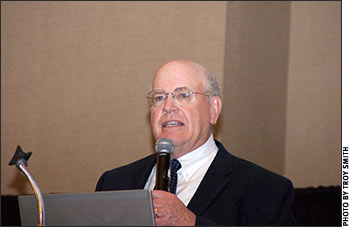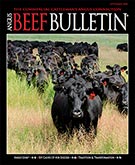Transferring Technology
MU Division of Animal Sciences receives grant to develop The National Center for Applied Reproduction and Genomics.
The Division of Animal Sciences at the University of Missouri (MU) College of Agriculture, Food and Natural Resources boasts many strengths, including its vast research and work with beef cattle reproduction and genetics. The faculty, who have responsibilities in research, teaching, extension and economic development, are experts in taking their findings and sharing them with farmers, ranchers and the Missouri community as a whole.
With the help of a $300,000 grant from the USDA, the division will be able to expand on those leadership opportunities.

“We’re focused on helping farmers and ranchers understand the technology, but, more than that, to trust the technology and identify ways they can use it," said Jared Decker, an Extension beef geneticist at MU. "We want to educate producers and help them take that next leap.”
The grant, through USDA’s National Institute of Food and Agriculture, will be used to develop The National Center for Applied Reproduction and Genomics (NCARG) in beef cattle. The goal of NCARG will be to promote the economic impact of the technologies MU Animal Sciences faculty have developed and are using every day. The focus is on giving farmers and ranchers the answer to the question: “What is the return on investment if I invest in reproductive or genomic technologies?”
“We’re not just trying to fill people’s heads with new knowledge. It’s more about lighting a fire,” said Jared Decker, an Extension beef geneticist at MU. “We’re focused on helping farmers and ranchers understand the technology, but, more than that, to trust the technology and identify ways they can use it. We want to educate producers and help them take that next leap.”
The multidisciplinary grant is in partnership with the MU College of Veterinary Medicine. NCARG will have a big focus on continuing education for veterinarians, including educational and training opportunities for veterinary students, graduate students, farmers, ranchers and allied industry professionals.
“This center again underscores the collaborative environment between schools and programs that exist at Mizzou (MU) to advance training for veterinary and animal science students, and research that benefits Missouri stakeholders,” said College of Veterinary Medicine Interim Dean Carolyn Henry.
The idea for a center of this type has been discussed amongst faculty in the Division of Animal Sciences for the past few years. David Patterson and Mike Smith, both professors of reproductive physiology, have taught numerous full-day sessions at American Veterinary Medical Association meetings. With all of the programs in place at MU, Patterson and Smith had many discussions on ways to share that research on a national level.

“A center of this nature is the logical next step for our division. With beef cattle, there is so much technology that could help operations. We want to help transfer that technology to industry participants at all levels,” said David Patterson, professor of reproductive physiolog at MU.
“Our reproductive and genomic research is so closely tied — and both are great strengths within our division,” Patterson said. “A center of this nature is the logical next step for our division. With beef cattle, there is so much technology that could help operations. We want to help transfer that technology to industry participants at all levels.”
Patterson has led the reproductive extension work in the Division of Animal Sciences, with Decker leading the genetic extension efforts.
There will be a big focus on the economic impact of using these technologies, as well. Scott Brown, an assistant extension professor in the Division of Applied Social Sciences, will lend his expertise in agricultural and applied economics to the center.
“The returns available to farmers from adopting these technologies will ultimately drive their use, and it is critical we show the increase in profitability that can result from integrating reproductive and genetic technologies in commercial herds,” Brown said.
NCARG already has received numerous letters of support from veterinary medical professionals, U.S. beef breed associations, pharmaceutical houses, genomic testing companies, industry consultants, the artificial insemination industry, branded-beef and feeder-calf programs, and state agencies, organizations, and companies.
NCARG is still in the beginning stages of development. The group is seeking a location to house NCARG and is continuing to search for partnerships.
“We’re taking the model we’ve developed in Missouri over the past 20 years and making it a national center,” Decker said. “We’re hoping to spread the model of integrating research and extension in genetics, reproduction and economics — and putting that together. That’s worked really well in Missouri. Now, let’s spread it nationally.”
Along with Patterson, Decker, Smith and Brown, Bill Lamberson, Scott Poock, Thomas Spencer and Jeremy Taylor were part of the development of the grant.

Editor’s Note: Logan Jackson is an Agricultural Research Center news strategist in the Office of Marketing and Communications for the University of Missouri College of Agriculture, Food and Natural Resources.






